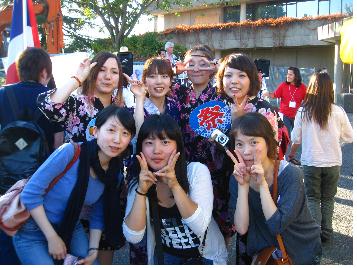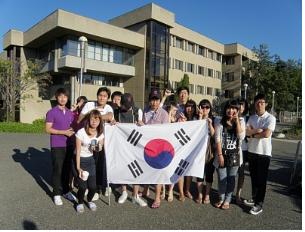Kim Na-ru(School of Electronic Engineering' 09)
I wanted to do many things when I became a university student. One of them was going on overseas trips or studying abroad. Therefore, I studied English steadily since 1st grade. When I was a sophomore, CBNU announced a studying abroad program at the beginning of the school term. There were two nations, U.S. and Canada. I applied to the Canadian program after considering time and costs for my case. Although I prepared expected questions and rehearsed the answers before the interview, it was a tough job to interview in English. When I was asked an unexpected question, I tried to give an answer. Finally, I passed the examination. When I heard that news, I was very happy. I didn't anticipate the result because I knew that I had messed up the interview.
At the end of my first semester, I was excited about going to Canada. However, I also was concerned about studying in an unfamiliar country. I asked a senior who had experienced this program for advice, and, in order to spend a fruitful month, I searched for information on the internet and in books. I met people who were going to Canada with me. We shared information and planned a trip to the state of Victoria and other regions together. I boarded an airplane filled with anticipation and uneasiness.
I was lucky to go to a university in the state of Victoria. At first, I just wanted to improve my English, but it was an unforgettable and precious experience for me to go to a university abroad.
I made a number of Japanese friends in UVIC. Honestly speaking, I didn't think that I improved my abilities in English because I mainly met the Japanese friends who were not proficient in English like me. However, that was not true in some senses. In reality, I could talk in English about various topics, such as Japanese dramas and movies with my foreign friends. We helped each other to improve our English. Because we had similar command of in English, I didn't feel a sense of deprivation anymore. I also became more intimate with Japanese students by learning each other’s languages. I stayed in a dormitory instead of doing home-stay so that I could take the classes with them and enjoy spending time together. Also, we went on trips together that made us get more acquainted with each other. At the end of a month-language training course, we felt sadness about being apart, but we exchanged letters.
The English program of UVIC started at 8:00 a.m., and I took two classes for about 3 to 4 hours from native speakers. In the afternoon, I could take part in a wide array of programs which were not mandatory. I tried to participate in as many programs as I could in order to improve my English. My team, which consisted of Japanese students, won a prize due to its proper teamwork when participating in ‘Amazing Racing’. I also attended the ceremony of introducing the excellence of Korean culture. I could make friends with many different kinds of foreign students through these activities. I participated in off-campus activities on weekends when there were no classes. At that time, I went on whale-watching trips and took trips to Seattle and Vancouver. Traveling in Vancouver gave me unforgettable memories. Before starting the trip, I arranged the schedule by receiving some good advice and searching on the Internet. During the trip, I spent much time speaking with Canadians while asking the locations and taking pictures. I was worried at first, but, in reality, it was easy. I'm envious of Canadian children because they live in good environment where everyone is kind and nature is wonderful. I could enjoy learning English for a month, and I was just so thankful to grab this opportunity of going to UVIC.


By Kong Hae-gyoung
hg31@cbnu.ac.kr


 All
All Experience
Experience






 공해경
공해경











